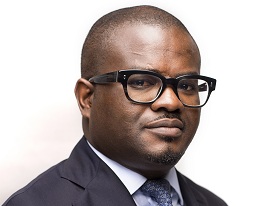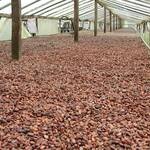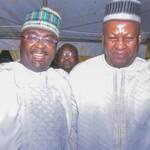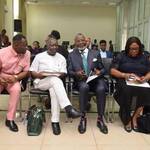President Nana Akufo-Addo has sacked Charles Adu Boahen, Minister of State at the Ministry of Finance who has been caught in an expose’ by investigative journalist Anas Aremeyaw Anas of Tiger Eye fame.
A statement signed by Eugene Arhin, Director of Communication at the Presidency said the case has been referred to the office of the Special Prosecutor.
It said the President spoke to the Minister about the contents of the expose’ before terminating his appointment.
Charles Adu Boahen, Minister of State in charge of Finance at the Office of the President, has revealed to Tiger Eye that the Vice President, Dr Mahamadu Bawumia, needs just USD200,000 token as an appearance fee and some positions by an investor for the Vice President’s siblings to get his backing and influence in establishing a business in Ghana.
This revelation was made in a meeting with Tiger Eye investigators, who in an undercover investigation, posed as businessmen, in a hotel room in the United Arab Emirates. This was an investigation into top-level corruption that undermines investor confidence in Ghana.
According to Charles Adu Boahen, the Vice President needs an appearance fee of only USD 200,000 for him to avail himself and offer his support to an investor.
This was when he was asked by the supposed businessmen on how an investor can get the attention of the Vice President and what must be given to him when finally in his presence.
“You mean, like appearance fees and stuff? I mean he, himself (the Vice President), if you give him some (USD) 200,000 or something as a token, as thank you, appreciation, that’s fine. He’s not really, he’s not really (like) that. All he needs is to worry about his campaign money in 2020,” Charles Adu Boahen revealed.
He added that, an investor must also consider opportunities for the siblings of the Vice President for his full support, apart from the USD200,000 appearance fee token to him.
“So, if you come with 3 or 4 projects and you say, we are doing this, we are doing that, (and) we are prepared to write a cheque for this, write a cheque (for that). You see, he has a big family. (The) Vice President has about 5 or 6 brothers and sisters. So, what may be, will happen is; if you tell him (the Vice President) that, hey, look, I want to do this project, do you have somebody that I can work with that you will introduce me to? And then, you know, he (the Vice President) will use that to immediately put his brother to work with us on a particular project. That’s how we would be able to work with him (the Vice President). You know what I mean? You see what I’m saying? And the development of his businesses,” the Minister of State in charge of Finance in the Office of the President added.
Adu Boahen, after having bundles of US dollars spread on a table in front of him and told to use it for shopping by the supposed business tycoon, promised to introduce the tycoon to the powers that be; the President, HE Nana Addo Dankwa Akuffo-Addo, and the Vice President, in Ghana. This, according to Adu Boahen, will make them, the supposed entity and tycoon, influential when they are in the country to establish their businesses.
He also emphasized how easy it would be for him to introduce the supposed businessmen to the President at a point in their transactions. He explained that the President was his late father, the late Professor Adu Boahen’s former campaign manager. He also claimed that the President is his uncle.
“The President himself is also, like my uncle. He was my father’s campaign manager when my father was running for office. So, he will also (come in).”
He, however, concluded that the Vice President is the most important power to be introduced to in the banking business, therefore the one to meet.
“But you know (that) at the operational level, the Vice President is the one who handles everything. So, he’s the guy we should go and meet.”
This was when he was asked about how he could lead ‘the business tycoons’ to the powerful people in Ghana who can give them influence while they operate in Ghana.
“Excellent. Excellent. You know, I was just telling (that) Isaac, that I have to introduce you to the Vice President. (The) Vice President is a very good man and he used to be the Deputy Governor of Bank of Ghana. So, if I tell him you want to come and open a bank, he will prefer it that way. As soon as you can, I have to introduce you. Because you know, even if I’m going to handle something like this, he’s somebody that I have to bring in at some level, even if not the whole details. Because, you know it is important that you get to know him,” Charles said.
When asked at the meeting what will be the cost for him, Charles Adu Boahen, to lead them to invest with about 500 million (US) dollars in Ghana, he said that he will take 20% of the amount that will be invested as commission for his services.
“Okay. No problem. Okay, let me think about that because (I) think we can manage something. Okay. Hm! This is tough. Sheik, what’s the right address? What should I call you? Okay, Sheik. Sheik, 20%,” he finally said.
This was after he had given the supposed entrepreneurs the options of either giving him a percentage before the work is done and the returns from this percentage will be his alone. Or just giving him a finance fee and share the returns made in the investment with him.
Charles, in the same instance, told the supposed business magnates that he only takes monies he has worked for. Instead of direct cash, he offered up options for the businessmen to plug money into his real estate business.
“Let me give you an example. I own myself a Real Estate company, so, we are into Real Estate. So, we just finished an office block. … I don’t wanna (want to) make money that I haven’t worked for it. You know, I believe in working for money. If let’s say we want to do affordable housing projects which would cost $15 million, you can come in and share that with me. If you bring the whole $15 million for the project, you can earmark 20% of that $15 million as mine, and whatever returns I make on that 20%, I keep. Or you put the money to work and give me a 10% finance fee, and then give me share of whatever returns on the project as well. We normally would make a return of maybe 25% returns, 30% dollar equity rate, when we do projects like that. So, it’s up to you and how (what) you are comfortable (with) and how you want to work,” he said as he gave these options.
He also tried to lobby for the supposed entity to buy a Debt Instrument (Bond) but was not successful as ‘the business magnates’ were not interested in that.
“But you are not allowed to buy any debt instrument? You know, we issue bonds. You know we just issued this energy bonds. Is he allowed to; can you buy bonds?”
The cash and President’s Minister
After all is said and done, the excited Minister of State in charge of Finance at the Office of the President, at the sight of bundles of US Dollars on the table for his shopping started spewing a lot of “thank you and we will do a lot of shopping” in appreciation. He pointed to the cash asking whether he can pack them into the black polythene bag added to the cash. Charles, after picking the black polythene bag, shaking it to open up and with the speed of light packed all the money into it with smiles all over his face. He picked up his file and other documents and added them to the polythene bag and left the room.
Meanwhile, Tiger Eye spoke with Dr Gideon Boako, the Economic Advisor and Spokesperson at the Office of the Vice President, on whether there has been an instance where the Vice President has authorized or discussed with anybody to solicit for funds for his political ambitions or an appearance fee/token for an investor to meet with him, the Vice President.
Dr Gideon Boako in response, told Tiger Eye that, there has not been any such instance or event to that effect as best as he can remember.
“So, on top of my head and having been with him closely, I will say no. I know how discreet he, the Vice President, is and he is smart and he wouldn’t even dare do such a thing”, Dr Boako remarked.
Dr Bawumia
My attention has been drawn to a video by Anas Aremeyaw Anas (as posted on his social media handle) showing the Minister of State for Finance, Mr. Charles Adu Boahen, apparently using my name, inter alia, to peddle influence and collect money from supposed investors.
I would like to state that if what the minister is alleged to have said is accurately captured in the video, then his position as a minister of state is untenable. He should be dismissed summarily and investigated.
I am not aware of any such meeting held by Minister Adu Boahen or a supposed “appearance fee”. My most cherished asset in life is my integrity and I will not allow anyone to use my name to engage in corrupt activities.




